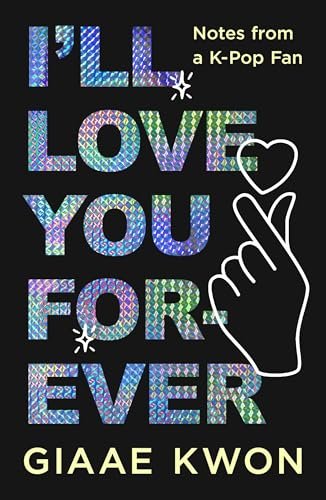Book Review: I’ll Love You Forever: Notes from a K-Pop Fan by Giaae Kwon
From the moment I picked up Giaae Kwon’s "I’ll Love You Forever: Notes from a K-Pop Fan," I felt a nostalgic pull back to my own brief, albeit fervent, fling with K-Pop. Kwon’s earnest exploration of fandom mirrors the complex, often messy relationship I had with music as a young adult, drawing me in with promises of shared anecdotes and revelatory insights. But while Kwon’s collection of essays offers glimpses into her life framed by the kaleidoscope of K-Pop, it left me pondering the weight of her words amidst my memories.
At its core, Kwon’s work is a blend of personal memoir and pop culture commentary, capturing both the high-energy thrill of K-Pop and the quieter, introspective moments of life. Her reflections do echo my own, particularly the camaraderie I felt with my brother as we immersed ourselves in catchy tunes like "Abracadabra" by Brown Eyed Girls and the heart-wrenching melodies of ThE THe Band. However, what became clear through her writing is a tension between the celebration of K-Pop and an almost reluctant recognition of its darker shades. Kwon’s duality of love and critique stands out, as she wades through the glitzy fantasy K-Pop sells while grappling with its underlying realities.
Yet, I couldn’t help but feel that Kwon’s connections to the idols felt tenuous at times, almost forced. Despite her apparent classical training in music, her descriptors often felt lacking, relying on adjectives that didn’t evoke the full richness of the songs she described. Instead of pulling me into a world of sound, Kwon often skimmed the surface—her commentary on H.O.T.’s “Hope,” for instance, did not impart the pulse of excitement I craved. I sensed the absence of a deeper resonance; as a reader with a nuanced love for music, I longed for her to weave a richer tapestry of insights.
Among the essays, some points — like her call for grace in understanding the pressures K-Pop idols face within their sociopolitical context — resonated strongly with me. In an era where idols are scrutinized for their thoughts on global issues, Kwon’s plea for compassion felt timely and important. Yet other sections felt disjointed, leaving me wondering if they belonged in the same breath as her musings on fantastical idolization. Moments like her brief foray into discussing Palestine after describing Jungkook’s solo debut felt jarringly out of sync, as if she lost her way in connecting disparate threads.
The charm of Kwan’s essays lies in her personal stories, yet these anecdotes sometimes felt milquetoast, lacking significant depth. The parallel drawn between her life and her idols could have been poignant, but often resulted in superficial comparisons, particularly in her relationship with BoA and IU. Her candid insecurities about body image alongside these idols left me uncomfortable, as if the validation of struggles were contingent upon comparisons that detracted from the very real experiences of each individual.
Ultimately, I found myself grappling with conflicting feelings as I turned the pages. While I appreciated Kwon’s earnestness and recognize the hard experiences that shaped her relationship with K-Pop, my skepticism about the genre’s commodification loomed large. K-Pop is undoubtedly a cultural phenomenon, but as Kwon demonstrates, it’s essential for fans to tread wisely amidst the shimmering surface, lest they lose sight of the artist behind the carefully curated image.
"I’ll Love You Forever" may speak to those navigating their identities within fandoms, especially younger readers discovering K-Pop in our TikTok era. If nothing else, Kwon’s collection serves as a reminder to appreciate the joys and complexities of music while remaining critically aware of the industry’s machinations. For me, this book was a step back into my past, a bittersweet reminder of what it means to love art, and the ways it shapes our lives—flawed, yet undeniably beautiful.
Discover more about I’ll Love You Forever: Notes from a K-Pop Fan on GoodReads >>







